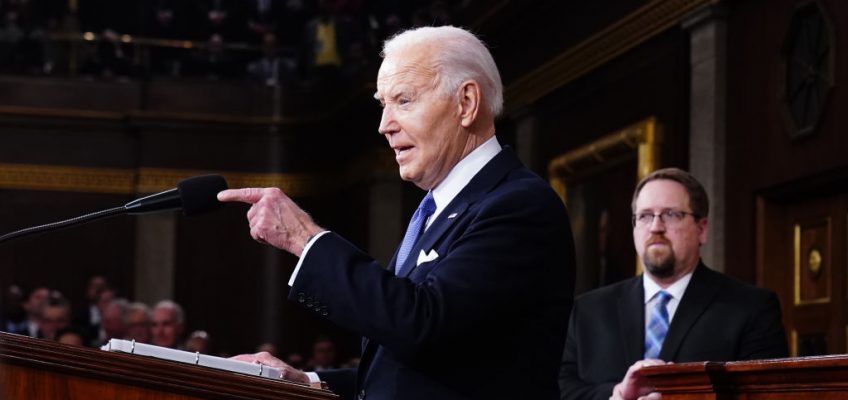As a piece of political theater, President Joe Biden’s State of the Union address was an energetic success. He effectively answered questions about his age, delivering a forceful speech that included several back-and-forths with interrupting Republicans. At times, it felt closer to the atmosphere of question time in the UK Parliament, which may be disconcerting to some SOTU traditionalists but which served to put the president’s wits to the test in a way that no prepared text could have.
As a matter of substance, however, the question is whether Biden can turn back political time and win an age-old economic policy argument. To do that, he is going to have to risk offending members of his own party and engage in what Republicans have traditionally criticized as class warfare. He can start on the swing-state tour that he began the other day in Georgia and continues this week in New Hampshire, Michigan and Wisconsin.
The story of Biden’s polling thus far is that he’s held on remarkably well with the constituency of college graduates who voted for him in 2020. He’s lost ground with a group that Democrats had come to think of as their base: younger, working-class African-American and especially Hispanic voters who still back Biden over Trump, but by much smaller margins than they did four years ago.
These voters, Democratic pollsters tell me, differ from party loyalists in a few crucial ways. One is that they are simply less engaged with politics and the political system. Another is that they care less about climate change and democracy — and more about the budget deficit and the cost of living.
Biden’s speech had some ideas to offer this group, and they were distinctively populist.
He proposed, first and foremost, a series of regulatory crackdowns as his solution to cost-of-living concerns. From a war on abusive “junk fees” to calls for rules against “shrinkflation,” the focus was not really on the macroeconomic roots of inflation so much as on generally consumer-friendly policymaking. Similarly, the president touted his victory in reducing the price of a handful of prescription drugs in the Inflation Reduction Act, and called for a huge expansion of Medicare’s bargaining authority. Last but by no means least, he promised antitrust enforcement against landlords and collusive algorithms that serve to raise rents.
On the deficit, the president pressed a strong case on taxes — noting, correctly, that the Republican Party’s tax-cutting ambitions will blow a hole in the deficit and either raise interest rates or endanger Social Security and Medicare.
That focus on the deficit is timely and appropriate, as new research indicates that the Federal Reserve’s war on inflation, while probably necessary, has itself been a source of consumer discontent because it has helped raise borrowing costs. Biden has been calling for higher taxes on the wealthy throughout his presidency, but last week his emphasis was on using the revenue not to expand programs but to reduce the deficit. In wonkier terms, the idea is that higher tax revenue from the rich will result in less borrowing by the public sector, leading to cheaper debt for the middle class.
What the president didn’t offer on budget issues was any kind of gesture toward bipartisanship. In essence, Biden took the progressive agenda, selected the elements that are plausibly disinflationary, and talked about them.
Of course, even if Biden had offered a balanced package featuring both tax increases and entitlement reforms — as Bill Clinton and Barack Obama did before him — Republicans would have rejected it out of hand. All the same, that didn’t stop those Democratic presidents from making such offers, which helped to establish them as the reasonable middle. Biden, by contrast, vowed to unconditionally protect Social Security and Medicare benefits — a popular applause line and a sharper contrast, but also a less moderate image.
Biden did not offer any ideas to address the cost of living that you wouldn’t expect to see a progressive endorse. There was no bipartisan fiscal commission. No call for belt-tightening on the part of the federal government. No plan to relax regulation in any area. The president didn’t even tout the record levels of oil and gas production unfolding on his watch, even though doing so would have required absolutely no policy concessions.
A speech is a speech, of course, and not a policy. I happen to know, for example, that the White House is aware of the need for regulatory changes to increase the supply of housing and bring down costs. But these are not things that can be achieved through unilateral presidential action. The ultimate test of the president’s housing policy, fiscal negotiations and regulatory priorities will be what he does, not what he says.
My argument is not necessarily that it was a mistake for the president to use his speech to restore the flagging spirits of Democrats and poke at the inflated grievances of Republicans. Partisanship has its place, and that now apparently includes the State of the Union address. My point is only to ask whether the best way to win over persuadable voters is with a pure left-populist economic message rather than an appeal to the moderate middle.
Related Articles
Column: Best Oscar night in a long time. Here’s why, in 5 easy pieces
Clarence Page: Joe Biden’s campaign could use some star power. Paging Taylor Swift?
Pamela Paul: Civil discourse on campus is put to the test
David Brooks: Models for a generous American patriotism — and national self-confidence
Nicholas Kristof: The school issues we’re battling over aren’t the ones that matter


Leave a Reply